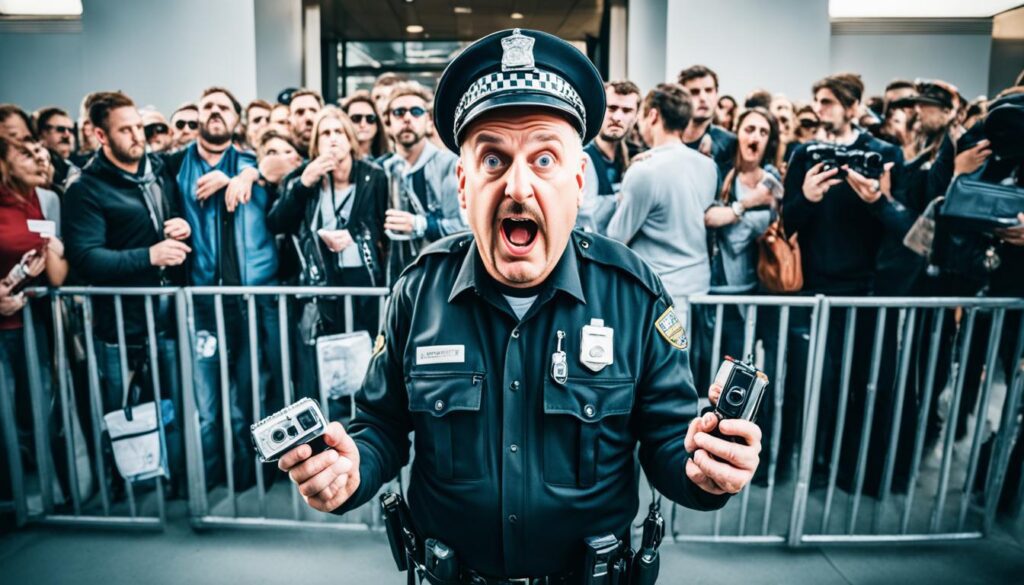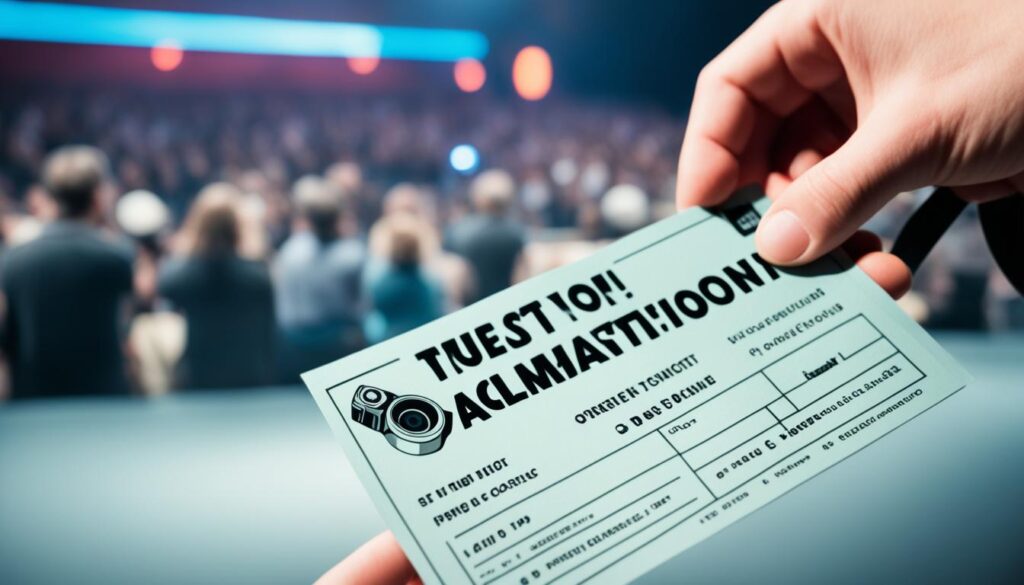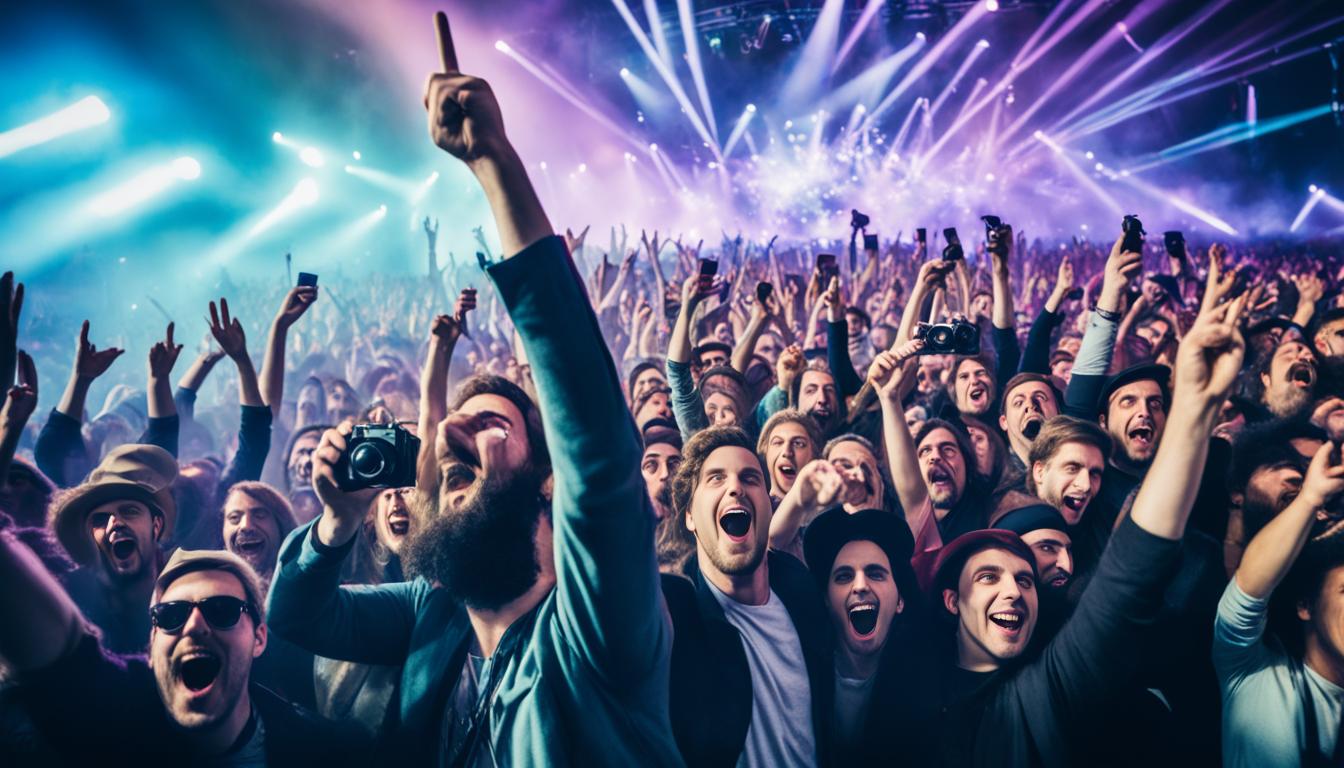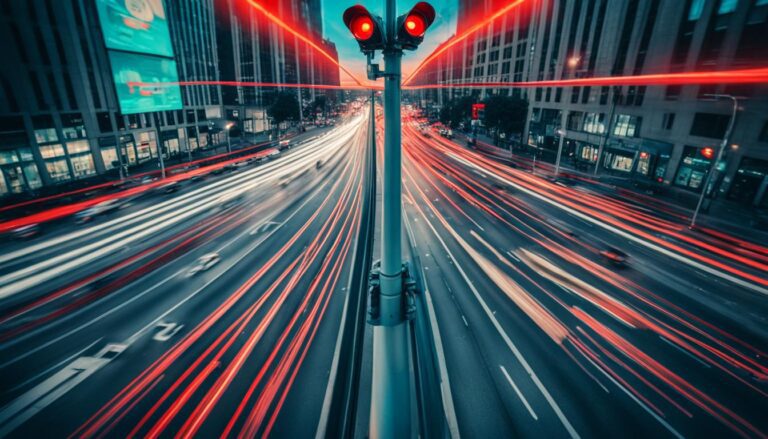are cameras allowed in concerts
When attending a live music event, many of us wish to capture the exhilarating moments with our trusty cameras. But are cameras actually allowed in concerts? The answer may surprise you.
Camera policies at concerts can vary widely, with some venues embracing personal cameras and others strictly prohibiting them. The reasons behind these policies are diverse and can include copyright concerns, security considerations, and the preferences of the artists themselves.
So, what are the camera policies at your favorite concert venues? Is it a free-for-all, or are there strict guidelines in place? Let’s dive deeper into the world of concert photography and unravel the mysteries behind camera policies at live music events.
Key Takeaways:
- Camera policies at concerts can vary depending on the artist’s preference and the venue’s regulations.
- Checking the concert venue or artist’s website for specific camera policies is crucial before attending a concert.
- Obtaining permission in advance is necessary for those who want to take photos or videos at a concert.
- Allowing cameras at concerts can benefit fans, artists, and venues by creating an engaging experience and promoting the event.
- Distracting other concert-goers, security concerns, copyright protection, and performer preferences are some reasons why cameras may not be allowed at concerts.
Understanding Camera Policies at Concerts
When attending a concert, it’s essential to be familiar with the camera policies set by the venue and the artist. Camera policies at concerts can vary significantly depending on the specific concert venue and the preferences of the performing artist. Understanding these policies beforehand will help you avoid any potential issues and ensure a smooth and enjoyable concert experience.
At some concerts, venues may prohibit the use of professional cameras with interchangeable lenses or any recording equipment without prior permission. Flash photography is also commonly prohibited, as it can be disruptive and distracting to both the artist and fellow concert-goers. It’s important to consider the views of those around you and refrain from using flash photography to maintain a respectful and enjoyable atmosphere.
Many concert venues have their own specific rules and regulations regarding cameras and recording equipment. These policies are in place to protect the artist’s intellectual property rights, ensure the safety and security of the concert-goers, and maintain the overall quality of the concert experience. It’s crucial to check the concert venue’s website or contact them directly to familiarize yourself with their camera policies before attending the concert.
It’s also worth noting that some artists may have their own specific preferences regarding photography and recording during their concerts. They may have specific requests or guidelines to provide a cohesive and immersive concert experience for their audience. These preferences may include restrictions on professional cameras or the use of personal cameras altogether. Respecting the artist’s preferences is essential to maintain a positive and respectful relationship between the artist and their audience.
Understanding and adhering to camera policies at concerts not only helps maintain a respectful and enjoyable atmosphere but also helps protect the intellectual property rights of the artist and the concert venue. By following these policies, you’ll contribute to creating an environment where everyone can fully immerse themselves in the music and have a memorable concert experience.
Check Before You Go
Before attending a concert, take the time to research the specific camera policies of the concert venue and the artist performing. By checking their website or reaching out to them directly, you can ensure that you have the most up-to-date information and avoid any unexpected surprises or disappointments. Understanding and respecting camera policies will help you make the most of your concert experience while maintaining a positive relationship with the artist and the concert venue.
Benefits of Allowing Cameras at Concerts
Allowing cameras at concerts can enhance the overall concert experience for fans, artists, and venues. By permitting fans to bring their cameras, we create a more engaging and immersive experience for concert-goers. Capturing their favorite artists and sharing those special moments on social media allows fans to relive the excitement and connect with others who share their passion for live music.
Moreover, allowing cameras at concerts benefits artists as well. The photographs taken by fans can serve as valuable promotional material, showcasing the energy and excitement of their performances. These images can be used for various promotional purposes, such as social media posts, website content, and album artwork. Additionally, artists can create additional revenue streams by selling official concert photographs to fans as a tangible keepsake of their concert experience.
For fans, allowing cameras enables them to preserve the memories of the concert in a tangible way. Having the ability to capture their favorite moments, whether it’s a breathtaking guitar solo or a crowd singing along, allows fans to relive those special moments and create lasting memories. It provides them with a tangible keepsake that they can revisit, share with others, and cherish for years to come.
The permission to bring cameras also allows for creative and artistic expression through photography. Fans can experiment with different angles, lighting, and compositions to capture unique and visually captivating images. This not only adds to the excitement of attending a concert but also allows fans to express their creativity and passion.
Image
The image above represents the joy and excitement of capturing live performances with cameras at concerts. It showcases the immersive and engaging experience that fans have when they bring their cameras to document the moments they love.
Reasons Why Cameras May Not be Allowed at Concerts

There are several reasons why cameras may not be allowed at concerts. Holding up cameras can be distracting for other concert-goers and can interfere with the overall experience. We want everyone to have an enjoyable time at the concert, and excessive camera usage can disrupt the immersive atmosphere that live music events strive to create.
Security concerns are another factor to consider. Unauthorized recording and the potential misuse of footage can compromise the safety and privacy of both the performers and the audience. Concert venues prioritize the well-being of everyone attending the event, and restricting camera usage helps maintain a secure environment for all.
Copyright protection is also a significant consideration. Performers and venues work hard to create unique and memorable experiences for their audiences. Allowing cameras without any restrictions poses the risk of unauthorized use of their images, potentially infringing on their intellectual property rights. By setting specific camera policies, artists and venues can safeguard their rights to the performance and ensure their creative work is protected.
Moreover, it’s important to acknowledge performer preferences. Some artists may have personal reasons or concerns about the quality of captured footage that lead them to prohibit cameras at their concerts. Respecting their choices helps create an environment where artists feel comfortable expressing themselves and delivering exceptional performances.
In summary, various reasons contribute to the decision of whether cameras are allowed at concerts. Factors such as distractions, security concerns, copyright protection, and performer preference influence camera policies. Understanding and respecting these considerations will ensure a positive concert experience for everyone involved.
How to Obtain Permission to Photograph a Concert

If you’re interested in photographing a concert, it’s crucial to obtain permission in advance to ensure a smooth and enjoyable experience. Here’s a step-by-step guide on how to go about it:
Step 1: Check the Concert Venue or Artist’s Website
First, visit the concert venue or artist’s website to check their specific photography policy. Many venues and artists have dedicated sections on their websites that outline their regulations regarding concert photography. Look for information on whether cameras are allowed, any specific restrictions, and the process for obtaining permission.
Step 2: Contact the Venue or Artist’s Management Team
If the photography policy isn’t readily available on their website, reach out to the venue or artist’s management team directly. Contact information can usually be found on their website or social media profiles. Write a polite and concise email or make a phone call to request permission for concert photography. Make sure to introduce yourself, state your intentions, and provide any relevant details about your experience or the purpose of your photography.
Step 3: Be Respectful and Professional
When contacting the venue or artist’s management team, it’s important to be respectful and professional in your communication. Remember that you’re asking for permission to document and capture their event. Use proper etiquette and address any concerns they may have regarding copyright, security, or artist preferences. Assure them that you’ll follow any guidelines or restrictions they set and emphasize your commitment to promoting a positive concert experience.
Obtaining permission to photograph a concert is essential to maintaining a good relationship with the venue, artist, and fellow concert-goers. Respecting their policies and preferences ensures that everyone can enjoy the concert while preserving the artist’s rights and maintaining a secure environment. So, if you’re passionate about capturing live music moments through photography, be sure to obtain permission and adhere to the venue’s photography policy!
Conclusion
In conclusion, the camera policies at concerts can vary significantly depending on the venue and artist’s preference. It is crucial for concert-goers to check the specific guidelines and regulations before bringing their cameras to the event. Some venues may allow personal cameras, enabling fans to capture their favorite moments and share them with friends and followers. However, other venues may prohibit cameras due to distractions, security concerns, or the need to protect copyright.
If you are passionate about concert photography, obtaining permission in advance is essential. Check the concert venue or artist’s website for their specific photography guidelines and policies. If the information is not available, reach out to the venue or artist’s management team to request permission. Provide detailed information about your intentions for photographing the concert and be respectful in your communication. Following the guidelines and respecting the preferences set by the venue or artist ensures a positive experience for everyone involved.
Capturing memorable moments through photography adds to the overall concert experience. It allows fans to relive their favorite concerts and serves as a tangible keepsake. At the same time, it is important for concert-goers to be mindful of others around them. Avoid obstructing the view of fellow audience members and be considerate of their concert experience. By adhering to the camera policies and guidelines, we can create a harmonious and enjoyable environment for all concert attendees.


